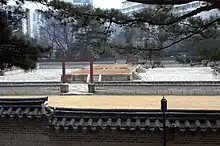| Sajikdan | |
|---|---|
 The shrine in 2014 | |
| Religion | |
| Affiliation | Korean Confucianism |
| Location | |
| Location | Seoul, South Korea |
| Geographic coordinates | 37°34′33″N 126°58′04″E / 37.5757°N 126.9677°E |
| Korean name | |
| Hangul | 사직단 |
| Hanja | 社稷壇 |
| Revised Romanization | Sajikdan |
| McCune–Reischauer | Sajiktan |
Sajikdan (Korean: 사직단) is a Neo-Confucian altar located in Seoul, South Korea. It was built and used during the Joseon period to perform rituals related to soil and grain.[1][2]
A founding element of the Joseon capital
Along with the royal palace (Gyeongbokgung) and the Jongmyo shrine, the Sajik shrine is a fundamental symbol of the new capital city created during its first year. It is located west of the palace, at the feet of Inwangsan, in the neighborhood of Seochon, and gave its name to the Sajik park that surrounds it, as well as to its administrative neighborhood Sajik-dong.
On this square altar were honored on key moments of the lunar calendar the national deities of earth (Sa) and grains (Jik).
Certain ceremonies have been recently revived in the square altars, to mirror the rites of Jongmyo jerye, now on the UNESCO's list of Masterpieces of the Oral and Intangible Heritage of Humanity.
See also
References
External links
- 서울사직단(seoul社稷壇)(in Korean) at the Seoul Metropolitan Government site.